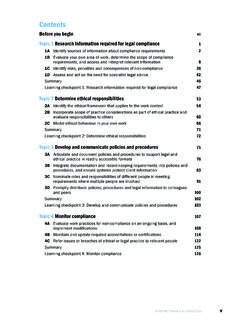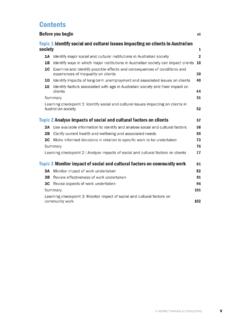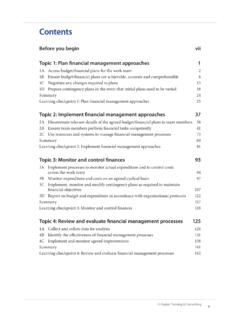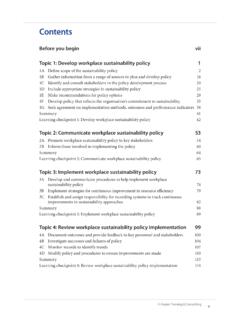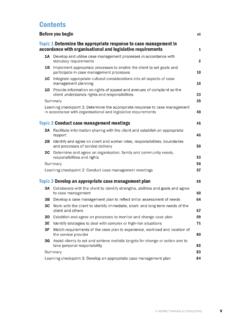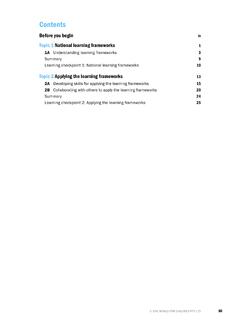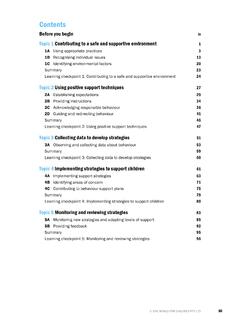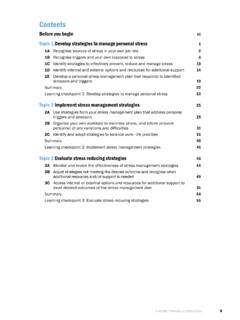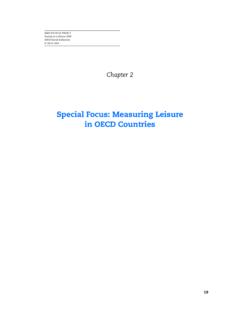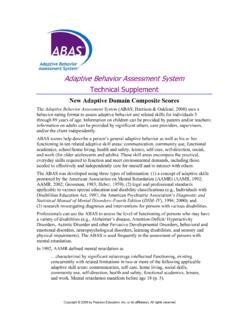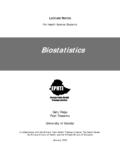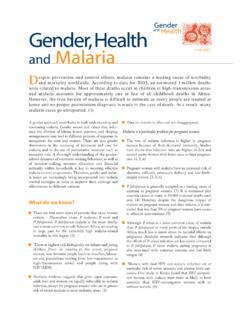Transcription of CHCLAH005 Incorporate lifespan development and ...
1 Contents Before you begin vii Topic 1 Identify the lifespan developmental stages of the person 1. 1A Identify aspects of development according to person's lifespan development stage 2. 1B Identify relationship between lifespan development stage and the needs, interests and skills of the person 12. 1C Identify person's behaviours consistent with lifespan development stage 18. 1D Identify cognitive processes that may impact on development stages across the lifespan 23. Summary 37. Learning checkpoint 1: Identify the lifespan developmental stages of the person 38. Topic 2 Identify how the Australian social context of health might impact on participation 41. 2A Identify social aspects of health provision and the impact on people 42. 2B Identify how demographic issues impact on health 47.
2 2C Identify health issues that impact on health service provision 54. Summary 60. Learning checkpoint 2: Identify how the Australian social context of health might impact on participation 61. Topic 3 Identify how the Australian social context of leisure might impact on participation 63. 3A Identify the role of leisure as part of the person's everyday life 64. 3B Identify approaches to leisure at different stages of the life cycle and its impact 76. 3C Identify perceptions and attitudes towards leisure 82. Summary 85. Learning checkpoint 3: Identify how the Australian social context of leisure might impact on participation 86. Topic 4 Identify strategies for participation 89. 4A Implement motivational strategies to maximise participation 90. 4B Ensure strategies are appropriate and clearly communicated 95.
3 4C Determine if perceptions are impacting participation in leisure activity 101. 4D Incorporate protective and inclusive practices into leisure service delivery 118. 4E Recognise behaviour or responses to illness and respond 123. Summary 128. Learning checkpoint 4: Identify strategies for participation 129. v CHCLAH005 . Incorporate lifespan development AND SOCIOLOGICAL CONCEPTS INTO leisure AND health . Adulthood XX There is a strong set of moral beliefs. XX Wide social networks are drawn from people known through work, family, social and sporting activities. XX Multiple roles are taken in life; for example, parent, worker, friend and partner. XX Time needs to be balanced across multiple responsibilities and roles. XX Interactions should focus upon providing relevant and realistic choices and support to suit the current needs of the individual.
4 Elderly XX There is an increased risk of social isolation and decreased contact with other people in social situations. XX Greater time is available for own activities. XX There is an increase in the possibility of a partner's death and decreased contact with other family members. XX Roles taken in life may be reduced; for example, the individual may no longer have work or parenting roles. XX Interactions should support the person at times of significant or changing need, and be respectful to the particular needs of the individual. Intellectual development across the life stages Intellectual or cognitive development and its relationship to psychological development have been well described by many researchers over the years, including Jean Piaget (1896 1980) and Erik Erikson (1902 1994).
5 According to them, humans move through a number of stages that can be identified by the presence of particular characteristics. Intellectual development is a series of stages through where people make qualitative changes as they acquire new knowledge. Decision-making is a cognitive process resulting in the selection of a belief or course of action. Here is further information on the characteristics of different stages of intellectual development . Characteristics of different stages Infancy A child in the sensorimotor stage in infancy is characterised as experiencing the world largely through the senses. Actions are repeated frequently at this stage and, over time, results mean some actions become more frequent, while others fade. Preschool children Preschool children embark on a period of discovery and very rapid cognitive development , which mirrors significant gains in language skills over the same time span.
6 The world and everything in it is explored, discovered, manipulated and employed. The child adds new words and language forms on a daily or weekly basis. 8 ASPIRE TRAINING & CONSULTING. CHCLAH005 . Incorporate lifespan development AND SOCIOLOGICAL CONCEPTS INTO leisure AND health . 1C Identify person's behaviours consistent with lifespan development stage There are behaviours that are consistent with lifespan development stage. Some are unique to a particular stage, while others behaviours overlap with two or more stages. This topic looks at behaviours that occur in different life stages. lifespan development in infancy The period of infancy begins at birth and ends at two years of age. It is the most rapid period of growth throughout the lifespan .
7 During this period, humans go from being helpless babies to toddlers who can communicate and reason. Here are the behaviours that typically exist in infancy. Typical behaviour during infancy 0 12 months XX No understanding for intentional behaviour XX No understanding of conscious reactions during interactions. XX Will cry to express needs, as they cannot communicate verbally. XX Uses actions to communicate likes or dislikes lifespan development in childhood: toddler The changes that occur from infancy into children are significant. Different aspects of growth and development are measured and include physical growth, cognitive growth and social growth. Here are the behaviours that typically exist in childhood: toddler. Typical behaviours during childhood toddler (ages 1 2).
8 XX Starts to explore cause and effect relationships XX Does not consciously plan actions or have control XX Does not have the capacity to understand, remember or obey rules XX Starts to develop independence XX Starts to test boundaries 18 ASPIRE TRAINING & CONSULTING. Topic 1. Identify the lifespan developmental stages of the person Categories of memory Memories can be categories tin three different ways, as shown here. Procedural memory Procedural memory is also known as motor skills, and is responsible for knowing how to do things. Procedural memory is part of the long-term memory where it stores information on how to do things such as walking, talking and riding a bike. Episodic memory Episodic memory is the memory of an event' or episode' These memories of events can be times, places, associated emotions, and other contextual who, what, when, where, why knowledge, that can be explicitly stated.
9 For example, remember the last time you ate dinner at a restaurant. The ability to remember where you ate, with who, and the items you ordered are all features of an episodic memory. Another example is remembering where you parked your car at a shopping centre this morning. Semantic memory Semantic memory refers to general world knowledge that we have accumulated throughout our lives. It is a more structured record of facts, meanings, concepts and knowledge about the external world. Semantic memory stands alone as simple knowledge and examples may include things as social customs, functions of objects or an understanding of mathematics. Semantic memory is generally derived from the episodic memory, whereby we learn new facts from our experiences Decision-making and reasoning Decision-making and reasoning are reflections of cognitive ability (at least in part) and are influenced by a great many factors.
10 Some of these are outlined here. Developmental stage The developmental stage of the person is a strong indicator of the reasoning and decision-making that can be employed. For example, a child in the pre-operational phase (around 2 6 years) is unable to use logic to reason and solve problems. They cannot yet manipulate objects in their head, although they do have a limited understanding of the world and the people and things within it. By contrast, a child who is in the concrete operational phase (7 12 years) is able to use logic to solve problems and can manipulate objects in their head. At this stage, however, children are not yet able to use sophisticated reasoning or abstract thought where one object is represented by something else (such as in algebra, where a letter is representative of a number).
